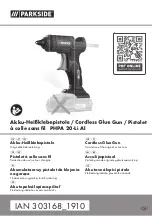
4
5
TERMINOLOGY
Magazine
Capacity
106 nails
Operating
Pressure
min. 70 PSI
max. 120 PSI
Cat.
No.
7150-21
Speci
fi
cations
Symbology
Air
Consumption
.04 ft
3
/cycle at
100 psi
Air
Inlet
1/4
in.
NPT
Read the Operator's Manual
Wear Eye Protection
Keep hands away
Fastener
Length
min. 0.625"
max. 2.125"
Collation
Angle
0°
Fastener
Size
18 gauge
Actuate
To cause movement of the tool component(s)
intended to drive a fastener.
Actuation System
The use of a trigger, workpiece contact
and/or other operating control, separately
or in some combination or sequence, to
actuate the tool.
• Single sequential actuation
An actuation system that requires the
workpiece contact and then the trigger
to be activated in a speci
fi
c sequence
to drive a fastener. Additional actuation
can occur when the trigger is released
and reactivated.
• Contact actuation
An actuation system that requires the
workpiece contact and the trigger to be
activated in any sequence to drive a
fastener. Additional actuation can occur
when either the workpiece contact or the
trigger is released and reactivated.
• Selective actuation
An actuation system that allows selec-
tion of actuation systems: single se-
quential actuation or contact actuation.
Fastener
A staple, pin, brad, nail, or other fastening
device which is designed and manufactured
for use in the tools.
Jam
An obstruction in the feed or drive areas of
the tool.
Workpiece Contact
An operating control element on the tool
intended to be activated by the workpiece
to be fastened.
SPECIFIC SAFETY INSTRUCTIONS
9.
Do not operate a tool if any portion of
the tool operating controls is inoper-
able,
disconnected, altered, or not work-
ing properly. This will cause unexpected
actuation, resulting in serious injury.
10.
Always keep hands and body away
from discharge area of the tool
. Never
attempt to clear a jammed workpiece
contact by grasping the discharge area
of the tool. Fasteners discharged from
tool can cause serious injury if they
contact hands or body.
11.
Do not drive fasteners close to the
edge of the workpiece
. Fasteners can
slip off corners and edges or penetrate
through thin material, making them
projectiles capable of causing serious
injury.
12.
Use the tool only for the intended
purpose. Do not abuse the tool
. Do
not use as a hammer, stamp or engrave
information onto parts, drop or impact
the tool or otherwise apply excess force
to the tool in use. Do not mount the
tool to stands or modify it for stationary
use.
13.
Do not carry tool by the air hose.
Only
carry the tool by the handle with your
fi
nger off of the trigger.
14.
Do not use this tool without the
safety warning label in place
. If the
label is damaged or missing, contact
MILWAUKEE
for a free replacement.
1.
Use air supply hoses with a minimum
working pressure rating of 200 psi.
2.
Use pressure regulators to limit the
air pressure supplied to the tool. Set
the regulators to no more than 120
psi.
3.
Install only hose couplings that will
allow all pressure to be removed from
tool when disconnected from the
source
. If the wrong
fi
tting is installed,
pressure may remain in the tool after
disconnection, allowing it to drive a
fastener, possibly causing injury.
4.
Prior to each use, check workpiece
contact and trigger for correct op-
eration
. Do not disassemble or clamp
parts of the workpiece contact, trigger,
or driving mechanism. This will cause
unexpected actuation, resulting in seri-
ous injury.
5.
Never point the discharge area of the
tool at any body parts or at other peo-
ple
. Always assume the tool is loaded
and capable of driving a fastener.
6.
Do not actuate the tool into free
space
. Do not engage in horseplay.
The discharged fasteners are projectiles
capable of causing serious injury.
7.
When using the tool, ensure the
workpiece contact is securely placed
on the workpiece
. Hold the tool
fi
rmly
and be prepared for the recoil.
8.
Do not remove, tamper with, or
otherwise cause the tool operating
controls to become inoperable.
This
will cause unexpected actuation, result-
ing in serious injury.
tool or serious injury to persons. Use
only clean, dry, regulated compressed
air at the rated pressure or within the
rated pressure range as marked on the
tool. Prior to using the tool, always verify
that the air source has been adjusted to
the rated air pressure or within the rated
air-pressure range. Air compressors
should comply with ANSI B19.3.
28.
DANGER: Do not use oxygen, com-
bustible gases or bottled gases
as a
power source for this tool. The tool will
explode and cause death or serious
injury.
29.
Never connect to an air source that
is capable of exceeding 200 psi.
Over
pressurizing the tool may result in burst-
ing, abnormal operation, breakage of the
AIR SOURCE




















